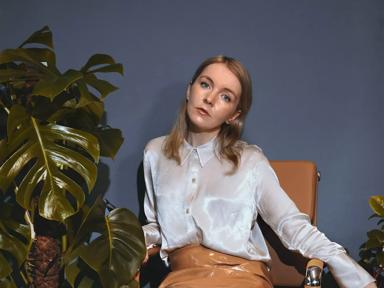Roisin Kiberd on The Disconnect and online friendship

‘I have spent more time with my laptop than with any living being on earth,’ writes Roisin Kiberd.
It’s tempting to look on such an admission with disdain, perhaps even an element of pity. That is until you pause to think for a moment, and subsequently realise you could probably make much the same claim. Still, having worked in tech, reported on tech, and once been employed as the online voice of a cheese brand, Kiberd’s exposure to our peculiar online world is higher than most. And it is this lived experience that has led to her writing The Disconnect: A Personal Journey Through the Internet.
A collection of essays, The Disconnect explores the oddities, excesses and outcomes of our modern online world. The lure of endlessly scrolling, the weird cult-like existence of energy drinks, the murkiness of dating apps; it’s all covered as Kiberd asks what our connection and disconnection to the internet gives us, and how the hell we got to this point.
On Sunday 24 October we’re lucky enough to welcome the author to our London Literature Festival, where she joins novelist Tahmima Anam and journalist and filmmaker Jenny Kleeman to discuss friendship on social media, and no doubt much more. But we couldn’t wait until then to hear from Kiberd about her collection and the world she perceives through it, so we caught up with her to find out more.
So Roisin, what prompted you to write The Disconnect? And did what the book is, change at all during the writing process?
The book changed completely while I was writing it! The book is a ship of Theseus! I started out with ten or so essays, and all but three of them ended up being replaced over several years.
I knew years ago – back before The Disconnect opens, in 2016 – that I wanted to write a collection of interconnected essays about technology and culture. But back then I was more interested in subcultures, and in the politics of online life. As time went on, those particular themes took a very dark turn. I found myself spending a lot of time studying troubling parts of the internet, like 4chan, eating disorder forums, or watching things like Gamergate and the alt-right play out on Twitter. While that research did inform The Disconnect, I also wrote it in a bid to get past these themes, which had led me to a kind of mental breakdown. I wanted to grasp at something deeper, which defined the era in which we live.
In writing The Disconnect you explored some of the internet’s more obscure subcultures, did any of them shock you? Or has a lifetime spent online pretty much prepared you for anything the internet can throw at you?
Shock is a strange thing. I often find that it affects me far later, in insidious and surprising ways, long after the fact. Forums for incels and ‘Men Going Their Own Way’ were like reading Houellebecq on steroids – they really got to me. Their worldview is one of the deepest despair and self-loathing, as well as loathing of women, and I suspect it’s more common than many would think.
To be honest, though, it’s more often the mainstream internet that irritates and disturbs me; I’ve muted the phrase ‘the discourse’ on Twitter, because it seems to attract only smug teenagers who have recently discovered Karl Marx. I also went through a phase of entertaining fantasies of recruiting hackers to attack the Daily Mail Online, because of the way they talk about women’s bodies. It didn’t work out. It’s probably for the best.
One of the things The Disconnect does is ask questions of things we’ve largely just accepted as being part of our modern world. Do you think we should be more willing to ask ‘why is that?’ of our environment?
That was my main mission in writing the book. With technology, and life in general, I think we’re in a kind of silent shock at how quickly things are changing, and that most of the time our actions are informed by an underlying panic, and distraction – we’re just muddling through instead of taking time to reflect. Books give readers, and writers, the chance to step outside time, in a sense, and gain perspective we’re denied in everyday life. I particularly loved the idea of slow thinking, and slow writing, as a form of resistance to Silicon Valley and its ‘move fast and break things’ philosophy.
‘I think we’re in a kind of silent shock at how quickly things are changing, and that most of the time our actions are informed by an underlying panic, and distraction – we’re just muddling through instead of taking time to reflect.’
We all have favourite real-life haunts – bars, coffee-shops, shops – is there a place on the internet you return to over and over again? A place or community online that you consider a kind of safe space?
There are so many! I try to curate my social media so that I only see useful or interesting or uplifting things. For a while I was immune to it, but lately I’m finding that ASMR works on me again. ItsBlitzzz on YouTube, for those who don’t know her already, is good. I also like random reflexology videos that teach you how to massage away sore wrists from typing for hours on end. Nature accounts and subreddits are also great. I particularly love /r/NatureWasMetal – if you were into dinosaurs as a child, you should get back into that – and Bat World Sanctuary, because bats deserve all the love. Lastly, there’s this magical, goblin-like dog on Instagram named Frizzy Chewbarka. The sight of her lifts my heart, on even the worst days.
You’re joining us for a talk looking at friendships on social media; has your own online existence ever inhibited a real-life friendship?
The divides, and the intersections between the two are so fascinating – it’s something I wanted to explore in The Disconnect. I think we’re always self-fashioning online, building and exploring identities, and living up to them in real life is a challenge.
Something I’ve noticed is that the people who mean the most to me, in life, have little to no presence on my social media. It’s not that I’m deliberately excluding them, there just isn’t any need to document friendships which have always existed offline. Those friends likely don’t keep up too closely with my online life either, which is centred around my work. That said, I’ve spent the last few years moving between different homes in different countries, so sometimes the online version of a friendship is the only option.
‘We’re always self-fashioning online, building and exploring identities, and living up to them in real life is a challenge.’
Did the Covid-19 lockdowns alter your views on our interaction with the internet, and the nature of online friendships at all?
It was definitely odd watching a large part of society struggle in ways I had experienced years earlier. Anyone who works freelance will probably relate; we’d already had to work out things like managing time, working from home, and finding ways to keep to a routine and alleviate the loneliness. I’m grateful, in that way, that I’d already written The Disconnect, and had basically worked out my own relationship with the internet, long before the pandemic started. It meant that while I did get caught up in it for a few weeks – watching the numbers, and refreshing news feeds – I was able to catch myself before the internet started to take over my life again.
Related to that last question, do you think we are ever our true selves online?
I suspect this is not a satisfying answer, but I’ve honestly started to doubt if there is a ‘true self’ at all, in this lifetime at least. Lately I try to be comfortable with the fact that I’m changing all the time, as is everyone around me.
I think the internet is a wonderful and terrifying tool for exploring aspects of our own identities. The problems start, however, when we lose that sense of experimentation, and expect people to match their online selves perfectly in real life. If we can collectively settle on a more realistic, forgiving vision of the self – one that doesn’t always make sense, that self- contradicts and falters, and learns – then I suspect we’ll be a lot better off as a society.
‘The internet’s a wonderful and terrifying tool for exploring our own identities. The problems start when we lose that sense of experimentation, and expect people to match their online selves perfectly in real life.’
Returning lastly to literature and the theme of our London Literature Festival, do you have a favourite book with friendship at its heart?
Is it really warped and revealing, in a negative way, if I say The Secret History by Donna Tart?! It’s one of my favourite books, full stop, and I think the dynamics between the characters, in particular the triangle of Richard, Camilla and Henry, play out like a heightened version of something we all go through in very early adulthood, where friendships are life-defining, and even small things feel acute and momentous.
Another odd example, possibly, is Virginie Despentes’ Vernon Subutex books. I found myself wishing I could live in their community of beautiful, angry oddballs supporting each other; I read the trilogy as an ecstatic, optimistic, but ultimately quite melancholy vision of friendship and shared politics.

Roisin Kiberd joins Jenny Kleeman and novelist Tahmima Anam at our London Literature Festival to discuss friendship and disconnection in the social media age on Sunday 24 October.